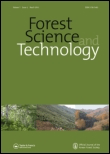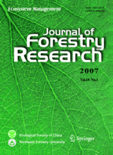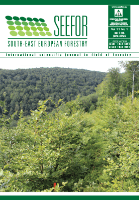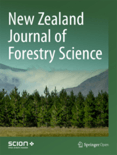
Lesnoy Zhurnal-Forestry Journal
Scope & Guideline
Transforming Insights into Action for a Sustainable Environment
Introduction
Aims and Scopes
- Forest Ecology and Biodiversity:
Research on the ecological dynamics of forest ecosystems, including species diversity, forest structure, and the impact of anthropogenic factors on forest health. - Forest Management and Silviculture:
Studies that explore sustainable forest management practices, including reforestation techniques, thinning, and the impact of forest management on timber yield and ecosystem services. - Wood Science and Technology:
Investigations into the properties and applications of wood and wood-based materials, including studies on wood modification, wood composites, and the technological advances in forestry machinery. - Climate Change and Adaptation:
Research addressing the effects of climate change on forest ecosystems, species adaptation, and the resilience of forestry practices in changing environmental conditions. - Forest Economics and Policy:
Analyses focusing on the economic aspects of forestry, including resource valuation, forest policy implications, and the socio-economic impacts of forestry practices. - Remote Sensing and Spatial Analysis:
Application of remote sensing and GIS technologies in forestry for monitoring forest health, assessing land use changes, and evaluating fire risk management.
Trending and Emerging
- Sustainable Forest Management Practices:
An increasing number of studies focus on developing and implementing sustainable forestry techniques that balance ecological health with economic viability. - Climate Resilience and Adaptation Strategies:
Research on how forests can adapt to climate change is gaining traction, with studies examining species resilience, carbon sequestration potential, and adaptive management strategies. - Innovative Wood Utilization and Bioproducts:
There is a rising interest in the development of innovative wood products, including biocomposites and biofuels, leveraging wood's properties for new applications in various industries. - Remote Sensing and Environmental Monitoring:
The integration of remote sensing technologies in forestry research is rapidly growing, facilitating advanced monitoring of forest conditions, health assessment, and land-use changes. - Forest Health and Pest Management:
Research focusing on the health of forest ecosystems, particularly in the context of pest and disease management, is emerging as a critical area of study, driven by ecological and economic concerns.
Declining or Waning
- Traditional Forest Exploitation Techniques:
Research focused on conventional logging and timber extraction methods appears to be waning as attention shifts towards more sustainable and innovative practices. - Historical Forest Management Practices:
Studies that primarily emphasize historical or outdated forest management practices are becoming less common, with a growing preference for contemporary approaches that prioritize sustainability. - Basic Dendrology Studies:
While foundational research in dendrology remains important, there is a noticeable decrease in papers solely focused on basic species identification and classification without applied context.
Similar Journals

Forest Science and Technology
Fostering collaboration in forestry for a sustainable tomorrow.Forest Science and Technology is a premier open access journal published by Taylor & Francis Ltd, based in the United Kingdom. Established in 2005, this journal has become a key platform for disseminating high-quality research in the fields of Forestry and Environmental Science, maintaining a strong impact factor and impressive Scopus rankings. As of 2023, it proudly holds a Q2 quartile ranking in Forestry and a Q3 quartile ranking in Management, Policy, and Law categories, highlighting its significance in addressing contemporary challenges in forest management and conservation. With a dedication to fostering scholarly communication, the journal supports open access since 2017, making valuable findings accessible to a wider audience, including researchers, professionals, and students. With the coverage period extending to 2024, Forest Science and Technology continues to contribute to the discourse on sustainable forestry practices and innovative management strategies.

Forest Ecosystems
Advancing knowledge for a sustainable future.Forest Ecosystems is a prestigious open access journal published by KEAI PUBLISHING LTD, dedicated to advancing knowledge in the fields of forestry, ecology, and conservation. Established in 2014 and located in Beijing, China, this journal has rapidly gained prominence, achieving Q1 status in multiple categories, including Ecology, Evolution, Behavior and Systematics, and Forestry in 2023. With an impressive rank of 19 out of 174 in the Scopus category of Agricultural and Biological Sciences - Forestry, it stands in the 89th percentile, reflecting its influential contributions to the field. The journal fosters scholarly discourse and disseminates innovative research aimed at understanding forest ecosystems and their vital role in our environment. Offering a robust platform for researchers, professionals, and students, Forest Ecosystems ensures accessibility through its open access format, enabling a wider audience to engage with and benefit from cutting-edge research dedicated to the stewardship of forest resources.

JOURNAL OF FORESTRY RESEARCH
Shaping the future of forestry with cutting-edge insights.JOURNAL OF FORESTRY RESEARCH, published by Northeast Forestry University in China, stands as a pivotal platform for advancing the field of forestry science. With an ISSN of 1007-662X and an E-ISSN of 1993-0607, this esteemed journal has maintained its commitment to disseminating high-quality research since its inception in 1997, converging into a recognized authority through the years. Currently boasting a Q1 ranking in the Forestry category for 2023, it ranks 18th out of 174 journals in its field on Scopus, highlighting its vital role in shaping contemporary forestry studies. The journal focuses on a broad spectrum of topics pertinent to forestry, including sustainable forest management, ecology, and conservation efforts, making it an indispensable resource for researchers, professionals, and students alike. Although it is not an open-access publication, the insights shared within its pages promise to contribute significantly to the advancement of knowledge and practices in forestry. The journal's significant impact and relevance are underscored by its operations from Harbin, People's Republic of China, where it continues to foster scholarly communication in the world of forestry research.

SEEFOR-South-East European Forestry
Innovating solutions for forestry management and conservation.SEEFOR-South-East European Forestry is a premier open-access journal dedicated to advancing knowledge in the field of forestry and environmental science. Published by the CROATIAN FOREST RESEARCH INSTITUTE, this journal has been operational since 2010, providing a platform for research that focuses on the unique forestry dynamics of the South-East European region. With an ISSN of 1847-6481 and an E-ISSN of 1849-0891, SEEFOR is recognized for its commitment to disseminating high-quality research that addresses critical issues in forestry management, conservation, and sustainable development. The journal is indexed in Scopus, placing it within the third quartile (Q3) of forestry journals, reflecting its significance within the academic community. SEEFOR aims to connect researchers, practitioners, and policymakers, fostering collaboration and innovation in fostering sustainable forestry practices in Croatia and beyond. Submissions are welcome in a range of areas including forest ecology, policy development, and socio-economic impacts, making it an invaluable resource for professionals and students alike.

Scientia Forestalis
Connecting scholars and practitioners for impactful forestry studies.Scientia Forestalis is a prominent academic journal dedicated to advancing the field of forestry and environmental studies. Established in 1996 and published by the Instituto de Pesquisa e Estudos Florestais (IPEF) in Brazil, this journal provides a critical platform for researchers and practitioners to disseminate innovative studies and findings in forestry. With an HIndex reflective of its academic impact and ranking in the third quartile of forestry journals, Scientia Forestalis is positioned to cater to a diverse audience, including scholars, professionals, and students engaged in agricultural and biological sciences. Despite its non-open access model, the journal maintains a commitment to high-quality research that fosters an understanding of forest ecosystems and sustainable practices. Published articles span a wide range of topics, ensuring that crucial developments in forestry science are captured and shared. The journal's current Scopus rank places it within the 26th percentile, affirming its role in shaping forestry research in a global context, making it an essential resource for anyone interested in this vital field.

NEW ZEALAND JOURNAL OF FORESTRY SCIENCE
Empowering Knowledge for a Greener TomorrowNEW ZEALAND JOURNAL OF FORESTRY SCIENCE (ISSN: 0048-0134; E-ISSN: 1179-5395), published by SCION, stands as a pivotal resource for researchers, professionals, and students dedicated to the fields of forestry, ecology, and plant sciences. With a strong commitment to open access since 2013, the journal promotes the dissemination of high-quality research and innovative practices within these disciplines, thereby fostering a greater understanding of the natural environment. The journal has achieved commendable rankings, being placed in the Q2 category in Ecology, Forestry, and Plant Science, reflecting its significant contribution to advancing knowledge and best practices in these areas. Based in Switzerland and published by SCION, a trusted name in forest research, the journal plays an integral role in shaping the dialogue around sustainable forest management and ecological conservation. As such, it serves as an essential platform for scholarly discourse and a valuable resource for anyone engaged in forestry and environmental studies.

Sumarski List
Advancing Forestry Knowledge for a Sustainable FutureSumarski List, published by the Croatian Forestry Society, serves as a key platform for the dissemination of knowledge and research within the field of forestry. Established in the early 1980s, this journal has maintained a consistent commitment to advancing the understanding of forest management, ecology, and conservation. With an ISSN of 0373-1332 and an E-ISSN of 1846-9140, it provides researchers and practitioners with valuable insights into current trends and practices in forestry, although it currently falls within the Q4 category in the 2023 forestry rankings. The journal is accessible primarily in printed format, promoting rigorous scholarship and discussion. The important contributions of Sumarski List are vital for fostering a greater appreciation of forestry in Croatia and beyond, making it an essential resource for those dedicated to tackling the pressing challenges in forest ecosystems.

ANNALS OF FOREST SCIENCE
Advancing Knowledge in Ecology and ForestryANNALS OF FOREST SCIENCE, published by Springer France, stands at the forefront of ecological research, contributing significantly to both the fields of Ecology and Forestry, as evidenced by its prestigious Q1 ranking in both categories for 2023. Since its inception in 1999, this journal has become an essential resource for academics, practitioners, and students who are eager to explore the complexities of forest ecosystems and their interactions with global environmental changes. With an ISSN of 1286-4560 and E-ISSN 1297-966X, it disseminates cutting-edge research and critical reviews that enhance our understanding of forest science. Although it does not offer open access, the journal continues to be a pivotal platform for presenting innovative scientific findings that address the pressing challenges of forest management and conservation. Its significant impact factor reflects the high-quality contributions that have made a lasting mark on the discipline.

CANADIAN JOURNAL OF FOREST RESEARCH
Empowering sustainable forestry through cutting-edge research.Canadian Journal of Forest Research (ISSN: 0045-5067, E-ISSN: 1208-6037), published by Canadian Science Publishing, stands as a leading platform for disseminating cutting-edge research in the field of forestry and ecological sciences. With an impressive impact factor and a steady reputation for high-quality publications, this journal occupies a prestigious position indicated by its Q1 ranking in Forestry and Q2 in Ecology as of 2023, alongside commendable placements in global and planetary change studies. Covering a broad scope from sustainable forest management to the impacts of climate change on forest ecosystems, the journal encourages submissions that address contemporary challenges and innovations in forest research. Operating from its base in Ottawa, Canada, the Canadian Journal of Forest Research has been a cornerstone of academic discourse since 1974, offering researchers and professionals vital access to pioneering studies that inform policy and practice in forestry. Researchers, educators, and students alike will find this journal an indispensable resource for advancing knowledge and fostering collaboration in the vital realm of forest research.

Journal of Forest Science
Exploring the intersection of ecology and forestry.Journal of Forest Science, published by the Czech Academy Agricultural Sciences, serves as a pivotal resource in the field of forestry and soil science. With its ISSN 1212-4834 and E-ISSN 1805-935X, this Open Access journal has been delivering insightful research since 2003, making knowledge freely available to researchers and practitioners globally. Hailing from the Czech Republic, the journal has established a notable impact within the academic community, as evidenced by its placements in the Q2 quartile for Forestry and Q3 for Soil Science according to the latest rankings. This positions the Journal of Forest Science favorably within academic discourse, ranking #73 out of 174 in Forestry and #84 out of 159 in Soil Science on Scopus, placing it at the 58th and 47th percentiles respectively. Covering a wide range of topics that intersect with environmental sustainability, forest management, and ecological research, the journal aims to foster innovation and collaboration within the scientific community. Researchers, professionals, and students can access published articles easily, bolstering the advancement of knowledge in forest science and its related disciplines.